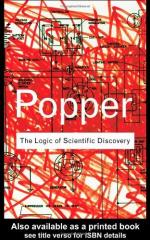
|
| Name: _________________________ | Period: ___________________ |
This test consists of 15 multiple choice questions and 5 short answer questions.
Multiple Choice Questions
1. What is one approach to knowledge considered by Popper?
(a) Purposive.
(b) Accidental.
(c) Inductive.
(d) Common sense.
2. What does Popper states the "game of science" is?
(a) An ultimate truth.
(b) A farce.
(c) A concept.
(d) A principle.
3. What does Popper feel is the result of adopting conditions to a hypothesis?
(a) It will lead to positive outcomes.
(b) It will verify any phenomena under investigation.
(c) It supports conventionalism.
(d) It guards against conventionalism.
4. What does Popper consider existential statements to be?
(a) Concrete.
(b) Logical.
(c) Tautological.
(d) Metaphysical.
5. What should the rules of epistemology adhere to?
(a) Psychology.
(b) Scientific theory.
(c) Demarcation.
(d) Logic.
6. What must be maintained in at each level of the experimental process?
(a) Integrity of testability.
(b) Systems of theories.
(c) Auxiliary hypotheses.
(d) Methods.
7. What does Menger say about definitions?
(a) They serve science well.
(b) They are based on observations.
(c) They are fruitful.
(d) They are dogmas.
8. What does Popper suggest is the result of using logic to justify a statement?
(a) Theories.
(b) A solution.
(c) A loop that logic cannot escape.
(d) More problems.
9. What guides a scientific experiment?
(a) Logic.
(b) Theory.
(c) Deductive reasoning.
(d) Inductive reasoning.
10. What happens if there is on falsifiable information?
(a) Learning does not occur.
(b) Experiments fail.
(c) Learning occurs.
(d) Conventionalism is proven.
11. What is a precondition for rational consideration?
(a) Subjectivity.
(b) Objectivity.
(c) Justification.
(d) Falsification.
12. What must a philosopher do to accept Poppers proposed definition of science?
(a) Read his background theories.
(b) Agree with its constructs.
(c) Understand empirical science.
(d) Accept the consequences.
13. According to conventionalism, what is required to make determinations of the natural world?
(a) Laws.
(b) Inferences.
(c) Theories.
(d) Proofs.
14. How must scientific statements be tested?
(a) Systematically.
(b) By their inductive consequences.
(c) Logically.
(d) By their deductive consequences.
15. What helps to realign or redefine accepted theory?
(a) Positive theory results.
(b) Deductive consequences.
(c) Positive justification.
(d) Falsification feedback.
Short Answer Questions
1. What holds the fate of a theory?
2. How does Popper investigate the chain of logical reasoning?
3. What does Popper admit is a problem with scientific investigations?
4. What does Popper consider to contribute to the cosmology of empirical science?
5. What does Popper think about statements in which individuals names do not occur?
|
This section contains 376 words (approx. 2 pages at 300 words per page) |

|




